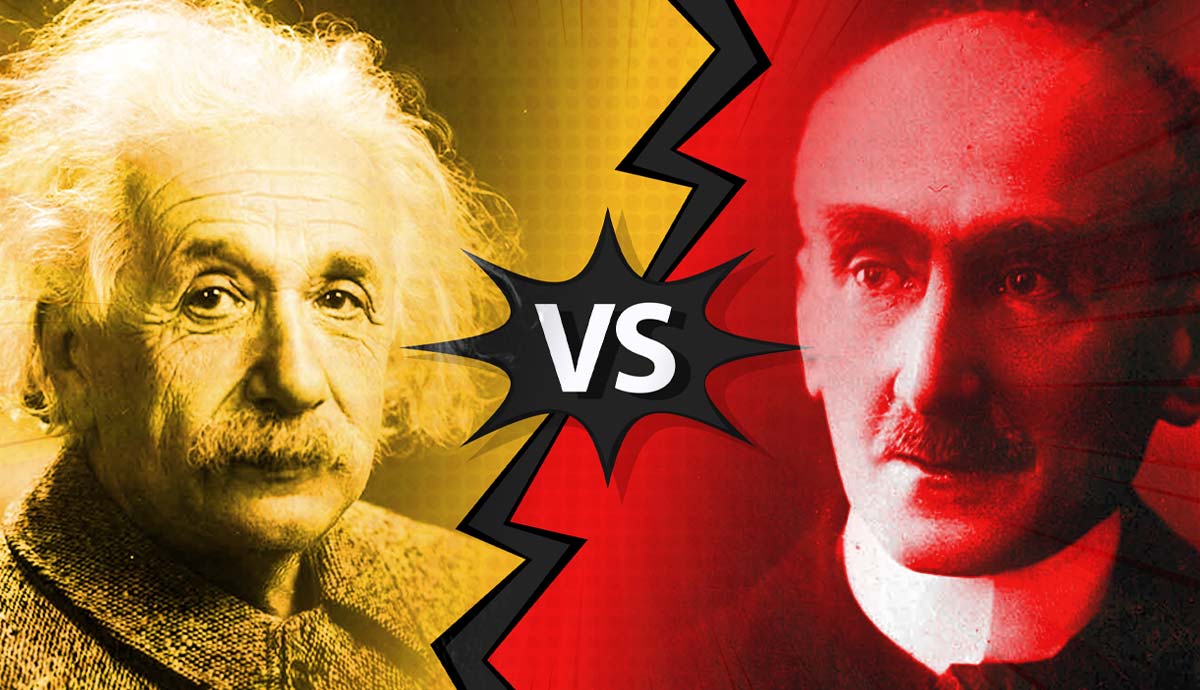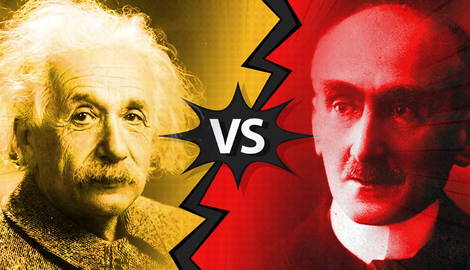
On April 6th, 1922, Bergson and Einstein debated on the fundamental conceptions of time—is it objectively measurable or subjective on experience? On the surface, the physicist and the philosopher stand on opposing sides of the debate, but can their definitions of time be compatible? This article will take a look at the differences and similarities between their theories and then explore the possibility of a middle ground between these two polar opposites.
Albert Einstein’s Theory of Time

The 1922 debate between a Nobel Prize-winning physicist and a philosopher with international fame was destined for the history books. This polarising debate began with Einstein’s publication of the theory of special relativity in 1905 and the theory of general relativity in 1915. The oft-called “Copernican” revolution in the scientific world also instigated a stringent discussion amongst philosophers on time and simultaneity.
The special theory of relativity is based upon a spacetime framework, meaning it refers to all points of three-dimensional physical space with the temporal dimension. We need to examine how Einstein developed the theory in depth to understand it in depth.
The Conception of Einstein’s Theories

The origins of Einstein’s theory were built upon Hendrik Lorentz’s theory of relativity, which was later substantiated by the mathematician Henri Poincaré. It posits the modifications of spatial and temporal intervals in a given setting because of motion through something mysterious called the “ether.”
What is ether? Well, it probably doesn’t really exist. According to these mathematicians, it is a hypothetical “all-pervading medium for electromagnetic phenomena and the propagation of light waves.” The ether isn’t something that we can see or touch but exists in the space between objects made of matter.
Einstein’s theory of relativity was based on the exact same analysis of spacetime and had a similar mathematical framework. However, his interpretation of this was entirely different. He proposed the hypothesis that there was no ether or any universal reference to motion.
This postulation arose two significant determinations regarding time. One was the idea of “slowing down” clocks or time dilation, which spurred multiplicity of times, which is a crucial part of relativity theory.
The other point was the temporal simultaneity of two events that happened at two different spatial locations. In addition, Einstein established that time and space were not truly universal and were inherently related—hence, the space-time theory.
One of the major new findings of the relativity theory was time dilation. This is one of the most crucial discoveries in the scientific world that shocked scientists and philosophers alike. It is the idea that in fast velocities—an object’s speed in relation to the direction of its motion—time slowed down, and at infinite velocity, it even stopped.
Understanding the Theory of Relativity

In Einstein’s scientific experiment, two clocks are set up at the same time relative to each other. One traveled at a constant speed, and the other stayed stationary. Upon noting the time on each clock at the end of the experiment, there was always a difference in the time shown. The observers themselves could not feel the time passing differently, but the clocks told a different story.
This difference between the stationary clock and the clock in motion is key to understanding the relativity of time that Einstein postulates. For Einstein, both the times on each clock were correct in accordance with the space in relation to the speed it occupied. Hence, he called the nature of time inevitably tied to the measurement of the clock, called “clock time.” This further contested any prior belief in science regarding absolute simultaneity as well because both clocks have differing times.
This came to be called the relativity of simultaneity. This theory argues that if two observers are in relative motion and two events occur simultaneously for one, that might not necessarily be true for the other observer, making the simultaneity relative rather than absolute for both observers.
Einstein’s Stance in the Debate

During the debate, Einstein explained his perception of time as having a clear and objective meaning: “There are objective events that are independent of individuals.”
This argument is that there is no “outside” of time and that time doesn’t necessarily depend on individual or human relation to it in order to be defined. The clock time is the objective time because it is a measurable unit that delineates the passing of an objective event.
The notion of time is independent of individuals because it doesn’t rely on their subjectivity. Instead, there is a sequence of concrete units that we call time.
For him, time is necessarily based on physical and empirical reality that can be observed through a measuring unit. Any subjective conception of time is just a psychological manifestation of the human brain. This psychological time isn’t real but rather something our mind makes up so that we can function.
Henri Bergson’s View of Time

Before his debate with Einstein, Henri Bergson had already worked extensively on the nature of time. His theoretical framework was based on ideas of subjectivity and the immediate human experience of time. Two of the main concepts that he dealt with regarding the notion of time were élan vital or vital impulse and the idea of duration (durée).
For Bergson, there was a necessary vital impulse that led to our most unexpected and novel productive creations. They were interwoven and tied with the universe and mankind in an overarching system. He argued that empirical and natural science tend not to consider this surge of vital impulse within and outside of creation, which is the basis for his critique of the Einsteinian system of relativity and time in particular.
This was significant for Bergson because, for him, “life permeates everything,” and ignoring the vital impulse leads to an incomplete analysis of time. This is the basis of his challenge to Einstein—that Einstein’s theory was incomplete.
Moreover, he put forward the notion of time as inextricable and embedded within the concept of duration. Duration is the aspect of time that can never be qualitatively measured; he also called this “lived time” in direct contrast to Einstein’s “clock time.” The subjectivity of time is only grasped by experiencing it through the individual’s consciousness.
The major discovery through these concepts, for Bergson, was the unifying strain of universal time, which seemingly contradicts Einstein’s theory of time dilation.
Considering these basic concepts of Bergsonian philosophy, we can move on to his critique of Einstein’s relativity theory.
Bergson’s Critique of the Theory of Relativity

Einstein’s special theory of relativity had specific elements that needed to be accurate for it to work. One of these was that the relative velocity of light is always constant relative to the observer, whether they are stationary or moving. For Bergson, this was concerning. He argued that because there is no universal reference (like ether in Lorentz-Poincaré’s theory), the theory becomes “symmetrical and reciprocal.”
This is quite complicated, but put more simply, it means that both observers can claim to take the position of rest or movement. To the overall theory, it doesn’t matter who is in the state of rest or action. The only requisite is to keep the resting body in the right corresponding position.
Bergson didn’t question whether time dilation occurred or not. Rather, the debate was about whether the equivalent and symmetrical positions of the observers were consistent with the deduced asymmetrical physical effects. This led him to conclude that Einstein’s conception of time as “real” and measurable was actually “bilateral,” leaving out the multiplicity of attributes that time possesses.
Bergson’s Stance in the Debate

Bergson’s objection wasn’t related to the physical and experimental validity of the relativity theory. He was more concerned with the metaphysical and philosophical implications of the theory.
He was interested in how the abstract ideas of a theoretical, scientific framework can be related to experimental and formal proof. At the time, there was already skepticism about Einstein’s theory, but Bergson had faith in the theory—although he had problems with it.
He believed that determining time was a complex undertaking because time wasn’t empirical in nature but rather was turned into quantitative units. Hence, he was against Einstein’s idea of “clock time” because a simple reading on a measuring instrument doesn’t show the overarching essentiality and the many attributes of time and temporality.
For him, time was an essential and inextricable part of existence that can’t be separated and atomized into different aspects. The notion of time in relation to duration, as Bergson argued, is deeply embedded in the nature of reality, hence physical spatial existence. The separation of the two wasn’t just arbitrary but caused incoherence within Einstein’s overall theory of relativity.
This shows that he wasn’t interested in the relativity theory’s epistemological content but rather in the metaphysical nature of time that it ruptured and left incomplete.
A Possible Common Ground

Einstein completely rejected Bergson’s critique, and Bergson didn’t fully accept Einstein’s relativity theory. However, they both rest on certain similar ideas, even though their overarching conceptions might be completely different. One of the main ones is in relation to the very radical approach of the time taken by Einstein, which is that time itself can be relative to different people.
His ontological view of time is in opposition to Bergson. However, in physical terms, he describes what Bergson argues for in metaphysics—that time is essentially relative depending on the observer’s position (Einstein) or the individual’s personal experience (Bergson).
Even though Bergson and Einstein believe in different theories of the reality of time, they come to their conclusions from a similar inception point: the absence of a “universal ether.” Einstein’s inception theory mirrors Bergson’s rejection of the traditional commonsensical view of time. Thus, we can see that both approaches have similarities when looking at the nature of time and the different aspects related to it.
Takeaways From Einstein and Bergson’s Debate

In conclusion, both the philosopher and the physicist had an original take on the nature of time. Bergson believed in the pure experiential view of time, which was incompatible with the Einsteinian system of special relativity.
There was a difference of opinion on the ontological meaning of time and its nature in relation to individuals. Einstein believed that physical aspects of time were completely separate from personal experience. However, Bergson saw time not as a separation like Einstein but rather as a unifying entity that was natural and regarded both as part of the human condition of consciousness.
This was not just a debate about time but also a justification for both the disciplines of physics and philosophy. It led to the analysis of intuition versus objectivity, which was deeply connected to the overall debate between the two. But as we can see, both thinkers did have some common ground, and it was the tension that ruptured and opened up questions about the true nature of time.










